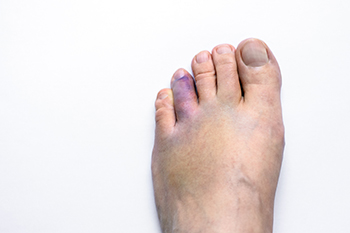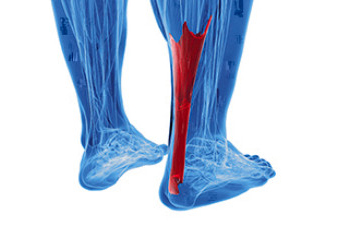Blog

An ankle sprain occurs when one or more ligaments in the ankle are stretched or torn, usually as a result of twisting or rolling the foot in an unnatural direction. Symptoms of a sprained ankle include pain, swelling, bruising, tenderness, and a limited ability to place weight on the affected foot. Discoloration and stiffness may also develop. Ankle sprains can happen during sports activities, walking on an uneven surface, or simply from wearing shoes that do not offer proper support. In more severe ankle sprains, tendons, cartilage, or nearby blood vessels may also be affected. A podiatrist can assess the sprain through a physical examination and imaging tests, such as an X-ray or MRI, to rule out fractures and identify the extent of the ligament damage. Depending on the severity, a podiatrist may recommend immobilizing the joint with a brace or boot. In some cases, surgery may be needed to restore joint stability and function. If you have sprained an ankle, it is suggested that you make an appointment with a podiatrist for treatment.
Although ankle sprains are common, they aren’t always minor injuries. If you need your ankle injury looked at, contact Dwayne A. Lay, DPM from Elite Foot and Ankle. Our doctor can provide the care you need to keep you pain-free and on your feet.
How Does an Ankle Sprain Occur?
Ankle sprains are the result of a tear in the ligaments within the ankle. These injuries may happen when you make a rapid shifting movement while your foot is planted. A less common way to sprain your ankle is when your ankle rolls inward while your foot turns outward.
What Are the Symptoms?
- Pain at the sight of the tear
- Bruising/Swelling
- Ankle area is tender to touch
- In severe cases, may hear/feel something tear
- Skin discoloration
Preventing a Sprain
- Wearing appropriate shoes for the occasion
- Stretching before exercises and sports
- Knowing your limits
Treatment of a Sprain
In many cases, the RICE method (Rest, Ice, Compression, and Elevate) is used to treat ankle sprains. However, you should see a podiatrist to see which treatment option would work best with your injury. In severe cases, surgery may be required.
It is important to ask your doctor about rehab options after you receive treatment for your injury. Stretching, strength training, and balance exercises may help the ankle heal while also preventing further injury.
If you have any questions, please feel free to contact our office located in Canton, GA . We offer the newest diagnostic and treatment technologies for all your foot care needs.

A bruised toe and a broken toe can cause pain and discomfort, but they have distinct differences. A bruised toe occurs when direct impact or pressure damages the small blood vessels under the skin, leading to discoloration, tenderness, swelling, and mild difficulty in movement. The pain is usually manageable, and mobility is often preserved. A broken toe results from a more severe injury, such as heavy impact or sudden force, causing a fracture in the bone. Symptoms include severe pain, swelling, bruising, difficulty moving the toe, and sometimes a visible deformity. A popping sound may be heard at the time of injury. While bruised toes typically heal with rest, broken toes often require medical evaluation. If you have injured your toe, it is suggested that you contact a podiatrist who can accurately diagnose bruised and broken toes, and offer appropriate treatment solutions.
Broken toes may cause a lot of pain and should be treated as soon as possible. If you have any concerns about your feet, contact Dwayne A. Lay, DPM from Elite Foot and Ankle. Our doctor will treat your foot and ankle needs.
What Is a Broken Toe?
A broken toe occurs when one or more of the toe bones of the foot are broken after an injury. Injuries such as stubbing your toe or dropping a heavy object on it may cause a toe fracture.
Symptoms of a Broken Toe
- Swelling
- Pain (with/without wearing shoes)
- Stiffness
- Nail Injury
Although the injured toe should be monitored daily, it is especially important to have a podiatrist look at your toe if you have severe symptoms. Some of these symptoms include worsening or new pain that is not relieved with medication, sores, redness, or open wounds near the toe.
If you have any questions, please feel free to contact our office located in Canton, GA . We offer the newest diagnostic and treatment technologies for all your foot care needs.

An Achilles tendon tear is a painful injury that often occurs during activities that involve sudden starts, stops, or pivots, especially in sports or while running. The Achilles tendon, which connects the calf muscles to the heel bone, is essential for walking, running, and rising onto the toes. A torn Achilles tendon may happen suddenly, often with a popping sound, followed by sharp pain at the back of the ankle. Patients may find it difficult to push off the foot or stand on their toes. In many cases, the foot may exhibit abnormal movement, including excessive pronation or supination, which can place strain on the tendon. A podiatrist can examine your ankle and foot alignment, assess range of motion, and determine the extent of the tear using diagnostic tests. If the tendon is completely torn, surgery may be required to restore function. A podiatrist can also help guide you through non-surgical recovery methods, including immobilization, and provide support for proper foot biomechanics. If you have injured your Achilles tendon, it is suggested that you make an immediate appointment with a podiatrist for an exam, diagnosis, and treatment.
Achilles tendon injuries need immediate attention to avoid future complications. If you have any concerns, contact Dwayne A. Lay, DPM of Elite Foot and Ankle. Our doctor can provide the care you need to keep you pain-free and on your feet.
What Is the Achilles Tendon?
The Achilles tendon is a tendon that connects the lower leg muscles and calf to the heel of the foot. It is the strongest tendon in the human body and is essential for making movement possible. Because this tendon is such an integral part of the body, any injuries to it can create immense difficulties and should immediately be presented to a doctor.
What Are the Symptoms of an Achilles Tendon Injury?
There are various types of injuries that can affect the Achilles tendon. The two most common injuries are Achilles tendinitis and ruptures of the tendon.
Achilles Tendinitis Symptoms
- Inflammation
- Dull to severe pain
- Increased blood flow to the tendon
- Thickening of the tendon
Rupture Symptoms
- Extreme pain and swelling in the foot
- Total immobility
Treatment and Prevention
Achilles tendon injuries are diagnosed by a thorough physical evaluation, which can include an MRI. Treatment involves rest, physical therapy, and in some cases, surgery. However, various preventative measures can be taken to avoid these injuries, such as:
- Thorough stretching of the tendon before and after exercise
- Strengthening exercises like calf raises, squats, leg curls, leg extensions, leg raises, lunges, and leg presses
If you have any questions please feel free to contact our office located in Canton, GA . We offer the newest diagnostic tools and technology to treat your foot and ankle needs.
Blog Archives
- April 2025
- March 2025
- February 2025
- January 2025
- December 2024
- November 2024
- October 2024
- September 2024
- August 2024
- July 2024
- June 2024
- May 2024
- April 2024
- March 2024
- February 2024
- January 2024
- December 2023
- November 2023
- October 2023
- September 2023
- August 2023
- July 2023
- June 2023
- May 2023
- April 2023
- March 2023
- February 2023
- January 2023
- December 2022
- November 2022
- October 2022
- September 2022
- August 2022
- July 2022
- June 2022
- May 2022
- April 2022
- March 2022
- February 2022
- January 2022
- December 2021
- November 2021
- October 2021
- September 2021
- August 2021
- July 2021
- June 2021
- May 2021
- April 2021
- March 2021
- February 2021
- January 2021
- December 2020
- November 2020
- October 2020
- September 2020
- August 2020
- July 2020
- June 2020
- May 2020
- April 2020
- March 2020
- February 2020
- January 2020
- December 2019
- November 2019
- October 2019
- September 2019
